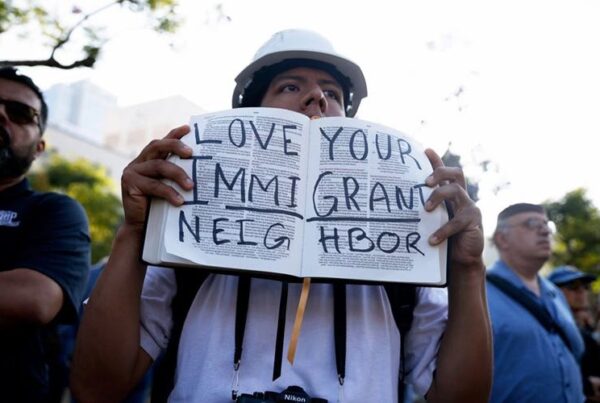This is the second blog in a series called On the Road with Elena. Follow along as Chasing Justice contributor Elena De La Paz, invites you on her justice journey as she works at Casa Esperanza, a ministry that serves migrants in the northern border town of Los Chiles, Costa Rica. In this series, she wrestles with what it means to follow Jesus’ invitation to live justly, so that everyone can flourish.
How do you actively renounce your participation in systems of complicity, violence and oppression?
In a world that is so complicated and beautifully interconnected, sometimes it feels like a losing battle. If I actively take steps to resist participation in this system, then it feels like I’m giving into another. It is a struggle to detangle yourself from the web of injustice.
But maybe that’s just it. We can’t simply detangle ourselves. We must do it juntos y juntas.
As followers of Christ, this is our form of resistance: praying—in word and embodied action—juntos y juntas, declaring that things are not the way that they should be, and daring to choose a different way. May these things be the oil of our worship. This is what the God of shalom seeks: worship done in the spirit of justice and the pursuit of truth.
Our souls are crying out:
Prince of Peace.
Teach us to lament.
Teach our bodies to pray.
Injustice Affects Everyone.
So what does this mean for me, Elena, with my feet currently planted in the northern border town of Los Chiles, Costa Rica, as I work with and learn from the migrants that are passing through?
As I’ve sat and listened to the realities that many brothers and sisters are confronted with as they migrate north, I must lament.
Taking in their stories with my own eyes and ears, glimpsing the traumas that accompany migrating in a global context that all too often doesn’t take into account dignity and flourishing, provokes profound laments inside of me. What a web of injustice.
At each moment along the journey, people are vulnerable to violence, exploitation, and dehumanization. It manifests as human trafficking, labor exploitation, food insecurity, a lack of shelter and family separation by systems designed to “help.”
What provokes the deepest lament inside of me is that webs are spun with intention—and this web of injustice is no different. One of the powerful web-spinners is me… and maybe also you.
Whether we intend to participate in these systems or not, we must be quick to recognize how our actions (and inactions) contribute to the spinning.
As U.S. citizens, we must recognize and take responsibility for the actions of our country. Our government spins a web of injustice that has horrific implications for our neighbor. We must recognize that our tax dollars and the policies that determine how these tax dollars are spent are incredibly powerful.
Policies Impact People.
Policies always show up on human bodies.
They might not be our own, but they always show up on somebody’s body. That somebody might not be our neighbor next door, or our neighbor the next city over—that neighbor could be countries and countries, and thousands and thousands of miles away. But these image bearers are my neighbor. I have to remind myself that I am not called to judge who my neighbor is, but to remember that we are all neighbors—interconnected, bound up in the same creation—made from the same dust.
One of the ways I am praying is by voting.
And the way that I am voting, is very much informed by my daily rhythms living in Los Chiles.
As I am learning to do research to understand more of the positions of candidates and the issues that are on my ballot, I’m frustrated at how easy it is to lose humanity, nuance, and story. Policies have become so partisan and our imaginations are being formed to think in very black and white terms. Without dialogue and creativity, it is impossible to imagine and live out the invitation of Jesus’ Kingdom.
Prayer As Embodied Action.
Inspired by 1 Corinthians 13 and the stories he heard from migrants in Los Chiles, one of my friends recently wrote this: “Love gets to know individual people instead of listening to the narratives of politicians.”
I agree with this statement wholeheartedly. However, I surprise myself by how quickly I forget these stories and get swept back into black and white political narratives. So, I remember the mural in the park again: el olvido es violento. “To forget is violent.”
To forget these stories is violent, because to forget the stories of my neighbors deceives me into believing that prayer is only the words that I say. It lulls me into complicity. It lulls me away from seeing my vote as a step that imagines and seeks the flourishing of our communities.
I must remind myself voting is essential to my discipleship. It’s a way that I can pray with my entire being, a way that I cry out for justice. It’s how I love my neighbor—the one that lives next door, down the block, the next state over, and yes countries away.
If I am supporting policies (whether with my tax dollars or with my choices) that perpetuate violence, separate families at the border, and burn people alive in Gaza, I am not living according to God’s vision of shalom.
These words are the prayers that I commit to embodying. Would you join me?
Prince of Peace,
Would our laments become embodied prayers.
Would we remember our own stories,
the stories of our neighbors,
and how all of these stories are bound up
into the story of all of Creation.
Would our narratives of fear become stories
that give space to the complexity and dignity
in the life of each human being. May we act justly and love mercy, juntos y juntas.

Elena De La Paz is a content creator with Chasing Justice. She is passionate about storytelling that challenges the “othering” of people, aiming to reveal our shared humanity. As a biracial person of color and an advocate for multicultural and intercultural living, Elena works with migrant communities abroad at Casa Esperanza. She loves how her work is an embodiment of hospitality, generosity, and solidarity across cultures, races, and languages.
The views and opinions expressed on the Chasing Justice Blog are those of the authors and do not necessarily reflect the official policy or position of Chasing Justice. Any content provided by our bloggers or authors are of their opinion and are not intended to malign any religion, ethnic group, club, organization, company, individual or anyone or anything. This series was edited by Chealsia Smedley.







